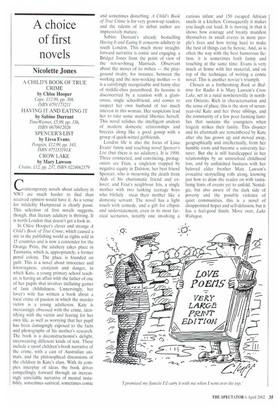A choice of first novels
Nicolette Jones
A CHILD'S BOOK OF TRUE CRIME by Chloe Hooper Cape, 412.99, pp. 308, ISBN 0701173211 HAVING IT AND EATING IT by Sabine Durrant Time Warner, £5.99, pp. 336, ISBN 0670912026 SPENCER'S LIST by Lissa Evans Penguin, £12.99, pp. 343, ISBN 075153191X CROW LAKE by Mary Lawson Chan°. £12, pp. 237, ISBN 0224062379 Contemporary novels about adultery in NW3 are much harder to find than received opinion would have it. As a venue for infidelity Hampstead is clearly passé. This selection of first novels suggests, though, that literary adultery is thriving. It is north London that doesn't get a look in.
In Chloe Hooper's clever and strange A Child's Book of True Crime, which caused a stir in the publishing world as rights sold in 15 countries and is now a contender for the Orange Prize, the adultery takes place in Tasmania, which is, appropriately, a former penal colony. The place is founded on guilt. This is a novel about innocence and knowingness, eroticism and danger, in which Kate, a young primary school teacher, is having an affair with the father of one of her pupils that involves titillating games of faux childishness. Unnervingly, her lover's wife has written a book about a local crime of passion in which the murder victim is a young adulteress. Kate is increasingly obsessed with the crime, identifying with the victim and fearing for her own life, as well as worrying that her pupil has been damagingly exposed to the facts and photographs of his mother's research. The book is a deconstructionist's delight, interweaving different kinds of text. These include a spoof children's-book narrative of the crime, with a cast of Australian animals, and the philosophical discussions of the children in Kate's class. With its complex interplay of ideas, the book drives compellingly forward through an increasingly unreliable narrative of mental instability, sometimes satirical, sometimes comic and sometimes disturbing. A Child's Book of True Crime is for very grown-up readers, and the talents of its debut author are impressively mature.
Sabine Durrant's already bestselling Having It and Eating It concerns adultery in south London. This much more straightforward narrative is comic and engaging. a Bridget Jones from the point of view of the not-so-Smug Marrieds. Observant about the mores of its milieu — the playground rivalry, for instance, between the working and the non-working mother — it is a satisfyingly recognisable and funny slice of middle-class parenthood. Its heroine is disconcerted by a reunion with a glamorous, single schoolfriend, and comes to suspect her own husband of too much interest in this woman. Her suspicions lead her to take some marital liberties herself. This novel relishes the intelligent analysis of modern domestic relationships and breezes along like a good gossip with a group of quick-witted girlfriends.
London life is also the focus of Lissa Evans' funny and touching novel Spencer's List (but there is no adultery). It is 1990. Three connected, and convincing, protagonists are Fran, a singleton trapped by negative equity in Dalston, her best friend Spencer, who is mourning the death from Aids of his charismatic friend and exlover, and Fran's neighbour Iris, a single mother with two lunking teenage boys who blithely treat their mother like a domestic servant. The novel has a light touch with comedy, and a gift for ellipsis and understatement, even in its most farcical scenarios, notably one involving a curious infant and 150 escaped African snails in a kitchen. Consequently it makes you laugh out loud. It is moving in that it shows how courage and loyalty manifest themselves in small events in most people's lives and how trying hard to make the best of things can be heroic. And, as is often the way with the best humorous fiction, it is sometimes both funny and touching at the same time. Evans is very much at home with her material, and on top of the technique of writing a comic novel. This is another novice's triumph.
Chosen as a forthcoming Book at Bedtime for Radio 4 is Mary Lawson's Crow Lake, set in a rural nowheresville in northern Ontario. Rich in characterisation and the sense of place, this is the story of sevenyear-old Kate and her three siblings, and the community of a few poor farming families that sustains the youngsters when tragedy strikes their family. This disaster and its aftermath are remembered by Kate after she has grown up and moved away, geographically and intellectually, from her humble roots and become a university lecturer. But she is still handicapped in her relationships by an unresolved childhood loss, and by unfinished business with her beloved elder brother Matt. Lawson's evocative storytelling rolls along, knowing just how to draw the reader on with tantalising hints of events yet to unfold. Nostalgic, but also aware of the dark side of poverty and the possible violence of quiet communities, this is a novel of disappointed hopes and self-delusion, but it has a feel-good finish. Move over, Lake Wobegon.






























































 Previous page
Previous page